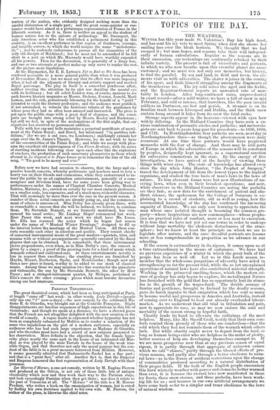PARISIAN THEATRICALS.
The great theatrical event, which had been so long anticipated at Paris, at length "came off" last week : in other words, Lady Tartufe—(people only use one " f " now-a-days)—the new comedy by the celebrated Ma- dame E. de Girardin, was brought out at the Comedie Francaise. Slight disappointments are familiar sequences of high expectations in this life of vicissitude ; and though we speak at a distance, we have a shrewd guess that the French are not altogether delighted with tho new creation in the world of comedy. A vague doubt is expressed whether hypocrisy has not been so completely exhausted by Atoliere as to render a selection of the same vice injudicious on the part of a modern authoress, especially an authoress who has had such large experiences as Madame de Girardin, and who therefore must have had a crowd of new subjects presented to her observation. More definite is the objection, that the female hypo- crite plays nearly the same part in the house of an infatuated old Mar- 1 shal as was played by the male Tartufe in the house of the weak iras- cible Orgon, and that therefore not only the moral purpose but the con- 1 duct of the fable is in a great measure borrowed from Moliere. However, it seems generally admitted that Mademoiselle Rachel has a fine part ; and that is a "great fact," after all. Another fact is, that the Emperor and Empress honoured the first representation of Lady Tartufe with their presence.
Lee enema d'Ilorace, a one-act comedy, written by M. Eugene Pierron and produced at the Odeon, is not one of those little bits of antique classicality which now and then work their way to the Parisian stage, and look exceedingly Parisian when they get there ; nor does it relate to the poet of Venusium at all. The " Horace " of the title is a M. Horace Prudent, who writes a book, on the emancipation of woman, but is cured by finding his own doctrines applied to his own wife. H. Pierre; the author of the piece, is likewise the chief actor.


























 Previous page
Previous page